#(of wunmi singing)
Photo


Dancing on the Edge (2013) // Lovecraft Country (2020)
#wunmi mosaku#angel coulby#jurnee smollett#lovecraft country#dancing on the edge#lovecraftcountryedit#perioddramaedit#ruby baptiste#letitia lewis#my edits#my gif#had a more elaborate set in mind#(of wunmi singing)#but this one's also something i've been meaning to post for aaages
237 notes
·
View notes
Text
[Music] God With Us - Hannah Olapade

Nigerian gospel singer Hannah Olapade just drop a brand new single titled” GOD WITH US “.
Commenting on this song, Hannah says, this song talks about God’s presence in our lives. His name is EMMANUEL (God is with me), when God is with you and for you, no one can be against you.
It is a song of appreciation and joy together with confidence that God is always available and ready to answer whenever you call him.
As humans, the presence of God is vital in our lives, because he takes away fears, loneliness, and worries off our lives.
May everything that will draw God out of our lives never come to us in Jesus’ name amen.
Watch Lyric Video Below;
https://youtu.be/0XQwss0xX2A
LYRICS
Solo 1a
I’ll tell of your goodness, oh God
Miracle working God
He’ll always come through
Cos he came through for me
Solo 1b
I read in your word how you did great and mighty things
You are still the same today
Oh I testify (Yeah…)
Yes I testify
Chorus:
Halleluyah, our God reigns x3
Emmanuel, God with us
Solo 2
I’ll sing of your praises oh Lord
You wiped my tears, you made a way
You always come through
Cos you came through for me
Bridge:
I am strong, courageous and I am not afraid
Cause the Lord God’s with me wherever I go
Back to chorus
Hannah Olapade Biography
Hannah Olapade also known as Wunmi, is a UK based Nigerian Female Gospel singer, songwriter, praise and worship leader and recording Artist.
She was born on the 30th of April in Lagos Nigeria into Christian home and has 2 siblings.
The musical journey of Hannah began as a child when she started composing songs with her sister. She sang in the children and teenagers choir in her early years before moving into the adult choir.
Hannah is passionate about endtime revival and kingdom expansion. She writes her songs through the inspiration of the Holy Spirit and is compelled at such a time as this to spread the gospel to the world through her music.
She also loves to teach and encourage others using God’s word, this she does through a YouTube channel Speaking Grace TV she co-host.
Hannah has ministered on various local and international platforms and currently serves in the worship team of RCCG breakthrough church, Greater Manchester, United kingdom.
Though a graduate of Economics and International Business, Hannah is very intentional with living purposefully which is why she is focusing on her passion and calling in the music ministry.
Hannah is happily married to Samuel Olapade and they are blessed with children.
Read the full article
0 notes
Link
SPOILER WARNING: Do not read if you haven’t seen all of Season 1 of “Loki,” currently streaming on Disney Plus.
Ever since “Loki” first premiered in June, Kate Herron, who directed all six episodes of the Marvel Studios series, has had to pretend like she knew far less than she really does. For one, she couldn’t acknowledge that the homages to sci-fi classics like “Blade Runner” and “Brazil” that she’d baked into the elaborate sets for the Time Variance Authority — the cosmic bureaucracy tasked with maintaining the sacred timeline — were “meant to be sinister” rather than just “playful and quirky.”
For another, Herron was delighted to see fans theorizing after the very first episode that Kang the Conqueror — a character already set to appear in the Marvel Studios feature “Ant-Man and the Wasp: Quantumania,” as played by Jonathan Majors — was really pulling the strings of the TVA. But until the finale streamed last Wednesday, she couldn’t even hint that those fans were only half right: Majors does play the mastermind of the TVA, but he’s a variant of Kang referred to as He Who Remains. It’s only after He Who Remains encounters Loki (Tom Hiddleston) and his female variant counterpart Sylvie (Sophia Di Martino), and Sylvie plunges a blade into his heart, that the multiverse is reborn, creating the possibility for Kang the Conqueror to emerge.
Again, though: Herron couldn’t acknowledge any of that, even to those closest to her.
“Nothing has prepared me better for working with Marvel than playing tabletop games with my friends,” she says with a laugh. “It definitely taught me how to have a good poker face. You have to hide your hand — and sometimes lie.”
Now, thankfully, all of that is behind her — as is “Loki” itself. Despite receiving widespread acclaim for her assured, ambitious, and visually sumptuous work directing the show, Herron says she has decided not to return for Season 2 of the series.
“I gave it everything — in my soul, in my heart, everything,” she says. “I feel so proud of the work we’ve done. And yeah, I’ll be enjoying Season 2 as a fan.”
She’s quick to sing the praises of everyone she worked with at Marvel, and she says she’s “sure” she’ll work again with the studio. For now, however, she’s ready to take a holiday, and then turn to a project she’s writing herself “that’s really close to my heart that I really want to make.”
“It’s my own decision, but I just feel like my part with ‘Loki’ is finished now and I’m just excited to see where his story goes,” she says.
Before she parts ways for good, however, Herron spoke with Variety about bringing Jonathan Majors into the Marvel Cinematic Universe, what she thought of the shocking revelation about infinity stones and what she would like to see happen in Season 2.
She always knew “Loki” would introduce Kang and the Multiverse…
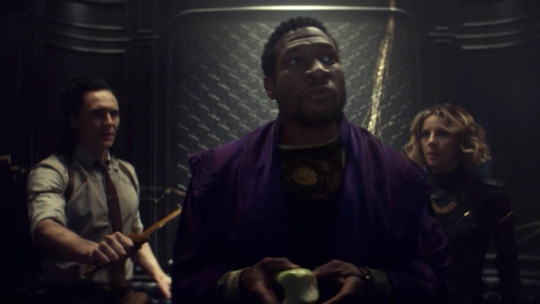
From the very start, Herron says, she and head writer Michael Waldron knew that their six-episode run of “Loki” would always end with Loki and Sylvie meeting He Who Remains at his citadel, the result of which would cause the creation of the multiverse.
As Episode 6 makes clear, both of these events were massive turning points for the future of the MCU — and Herron still can’t quite believe she got to be the one to make them a reality.
“We were just, like, waiting to be told, ‘Actually, guys, we’ve had a change [of heart],'” Herron says. Instead, Herron says she and “Quantumania” director Peyton Reed participated in casting Majors in the role.
“I was just like, pinch me,” she says. “I can’t believe I was at the table for that, because I know it was such a big decision for them all.”
Herron also decided to have Majors provide the voices for all three “Timekeepers” who are supposedly at the head of the TVA, but are revealed by Sylvie to be nothing more than “mindless androids.”
“We didn’t have someone cast for those voices,” she says. “I remember thinking, well, ‘Wizard of Oz’ is clearly a reference for us. We should have the wizard. It’d be great if it’s Jonathan. So we sent him all the art of the timekeepers. And he just kind of came up with these incredible voices for each of them.”
…but not with a cliffhanger.

The most significant decision of the season, though, may be that it ends with a giant cliffhanger, when Loki discovers he’s in a brand new reality for the TVA in which Mobius (Owen Wilson) and Hunter B-15 (Wunmi Mosaku) don’t even recognize him. But while Herron knew how this season of “Loki” would end, at first, she did not know that there would be any more seasons after it.
“When I started, there wasn’t a discussion of Season 2, exactly,” she says. “It was just that season of ‘Loki.’ As we got deeper into production, everyone was very happy, and obviously there’s so much to explore with Loki. It felt like we should continue the story. So I think the cliffhanger ending came in later in the process.”
Herron says she sprinkled in some hints to viewers that Loki is in a new timeline, like redressing sets to look slightly off, and recasting Eugene Cordero’s TVA receptionist Casey as a hunter headed to the armory in a blink-and-you’ll-miss-it moment. But her favorite bit is that the final line — said by Mobius to Loki — is the same as the first line spoken in the show, by a woman in the Gobi desert, also to Loki: “Who are you?”
“That was kind of the question of the whole first season,” Herron says.
She was just as shocked about the Infinity Stones as everyone else.
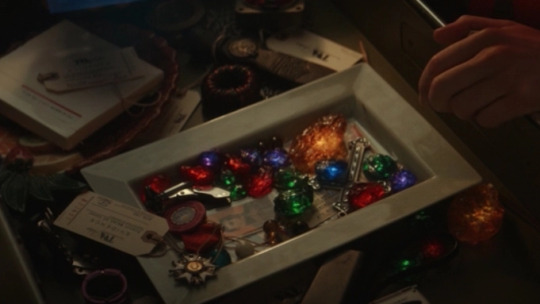
In the first episode, Loki discovers to his horror that not only does his magic not work inside the TVA, but Infinity Stones — heretofore believed to be the most powerful objects in the known universe — are just inert rocks there. The revelation sent shockwaves across the Marvel fandom; Herron was right there with them.
“That was in Michael’s script when I first got it to pitch [for the directing job],” she says. “I remember being like, ‘WHAT?! You put me through so much!’ But then I thought, ‘Oh, it’s kind of genius, because it shows how powerful the TVA are. Who are these people? What is this place?'”
Herron especially appreciated how her shock — and the audience’s — mirrored Loki’s own as the rug gets pulled out from under him. “I was quite excited by it,” she says. “It really shows you that there’s a new power in the MCU — and it’s not what we we spent the last decade dedicating our lives to.”
She told Kevin Feige she wanted gender parity among her crew.

Prior to “Loki,” Herron’s most high profile job was directing the second half of the first season of the Netflix dramedy “Sex Education.” She got the “Loki” job thanks to a 60-page pitch memo that filled out just about every detail of the world of the show. After hiring her, she says Marvel Studios chief Kevin Feige asked her, “What are your terms?”
“This was the first time I was gonna get to hire my heads of department on a television show I worked on,” she says. “I was like, I’d really love [the crew] to be 50/50 across gender.”
Herron says she wasn’t out to fill any jobs on the film with a specific gender. But, she says, “There aren’t enough women in these roles. They’re out there. It’s a lack of opportunity. It’s not a lack of interest.”
She did end up hiring two women for critical roles that are still rarely occupied by women: cinematographer Autumn Durald (“The Sun Is Also a Star”) and composer Natalie Holt (History’s “Knightfall”).
“I felt like she was inside my mind,” Herron says of Durald. “We have the same taste. And I love the way that she talks about light as a character.”
Herron hired Holt unusually early for a composer, after she’d completed editing the first episode during the pandemic shutdown. She knew that the particular sci-fi film noir look of the show that she was developing with Durald needed similarly unique music, and she liked that part of Holt’s pitch was focusing on Loki’s identity as a character.
“Her music then started to inspire how I wanted to shoot other scenes,” Herron says. She’s especially enamored of Holt’s vision for her dynamic and foreboding theme for the TVA.
“She was like, ‘Oh, let’s have that theme be Kang’s’ — well, He Who Remains, I guess, in our show. But I hope that will go on to be Kang’s theme. That was the real fun of it is that you feel like he’s really played a hand now across the whole show, because you realize that music is his music.”
Herron, Durald, and Holt all deliver distinctive and superlative work that’s nothing like the MCU has quite seen before — and nothing quite like anything previously in their careers, either. And that’s entirely the point.
“I think for us, it was about just showing people what we could do and that we could do it at this level,” Herron says.
The episode in which Loki comes out as bisexual was inspired by Alfonso Cuarón and Richard Linklater.

Every episode of “Loki” features multiple extended scenes of two characters just talking to one another, a rarity in a comic book production. Herron says that cutting Episode 1 together during the pandemic lockdown and seeing the scenes between Loki and Mobius (Owen Wilson) play out so well “definitely gave us confidence” to continue that rhythm for the rest of the show.
That was especially true for Episode 3. Written by Bisha K. Ali (who went on to create the upcoming Marvel Studios series “Ms. Marvel”), the episode is essentially an extended meet-cute between Loki and Sylvie as they get to know each other on a planet doomed for total annihilation.
“Bisha’s reference was ‘Before Sunrise’ and ‘Children of Men,'” says Herron. “And it lit my brain on fire. It was kind of weird. It was almost like a bottle episode in the sense that we’re just with the two characters, but obviously, it’s Marvel, right? So they’re bonding in this Apocalypse, which also feels very Loki at the same time.”
That episode is best known for making Marvel Studios history, when Loki casually mentions that he’s had dalliances with both men and women. Herron says that when she first interviewed for the job, she asked if the show was going to acknowledge Loki’s sexuality, which had long been established in the comics as bisexual or pansexual.
“I think everyone wanted to acknowledge it,” she says. “It was just really about giving a care and consideration and doing it in the right way. I think everyone knew it was gonna be quite a big moment. So it was just really about doing it in a way that felt respectful. And honoring it.”
Herron also confirms what many fans had suspected, that she deliberately made the lighting scheme for the scene evoke the blue, purple and red of the bisexual flag. “We knew what we were doing with that scene,” she says with a smile.
She has a lot of ideas for what she’d like to see in Season 2.
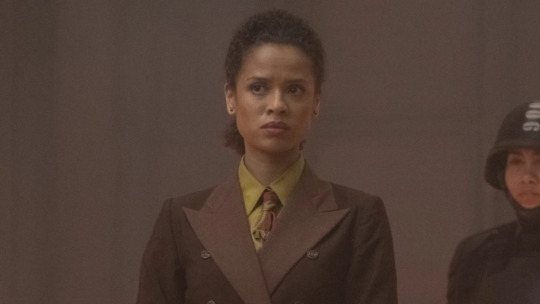
Since Herron will be watching Season 2 of “Loki” only “as a fan,” she is also free to wildly speculate as to what she’d most like to see happen — like how, wherever Loki story leads, “we’ve opened the door” for the character to explore his sexuality with men as well as women.
Otherwise? She says she wants to know where Judge Ravonna Renslayer (Gugu Mbatha-Raw) goes to when she leaves the TVA in search, she tells Mobius, of “free will.”
“I love her,” Herron says. “Gugu used to always call her an indoor girl, which made me laugh, but she is. She’s in the office, but she used to be this kick-ass Hunter. So I’m like, Okay, well, where’s her path going?”
Herron is also keen to learn more about Hunter B-15’s backstory — since she deliberately decided to hide it in the scene in Episode 4 when Sylvie shows B-15 her repressed memories as a variant.
“I was like, we shouldn’t see her memories,” Herron says. “It’s a character that thought they had power and realizes they have no power. It felt really powerful to at least give her some power in that scenario. The memories are private. They’re hers.” She pauses. “Also as a fan, I’m like, ‘Oh my God, who is she?!'”
“And obviously, you know, Loki and Sylvie?” Herron continues, on a roll. “He’s in a completely different reality. What’s going to happen to him? How will he get back? Or will he get back? And where’s Sylvie? She’s still in the Citadel? And the multiverse of it all. What the hell is going to happen?!”
Herron chuckles at her own excitement. “So I think there’s so many questions to be answered, and so much more road to travel with all our characters,” she says. “You know, I’m really proud that I got to set up Loki’s story here. But there’s so many different aspects of his identity and personality that’s yet to be explored. I’m excited to see where it goes.”
41 notes
·
View notes
Text
By order of the fookin’ PEAKY BLINDERS, it is done. It has been announced that the currently filming sixth season will be the series’ last.
Yep. No more staring into the tormented crystal blue eyes of Tommy Shelby.
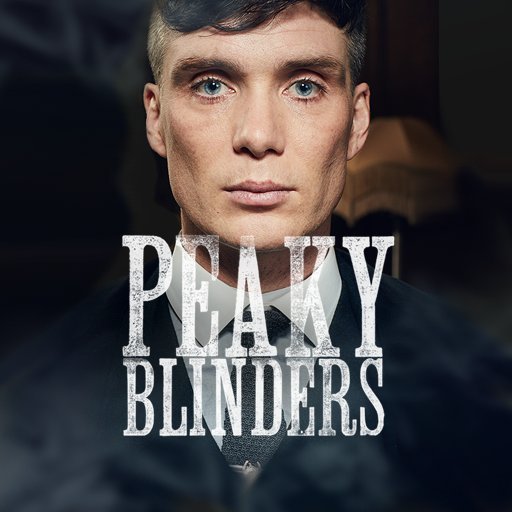
With the announcement of PEAKY BLINDERS’ cancellation comes the realisation that it is the second job Finn Cole has lost in a week.
The only worthwhile thing Michael Gray has done is the French inhale.
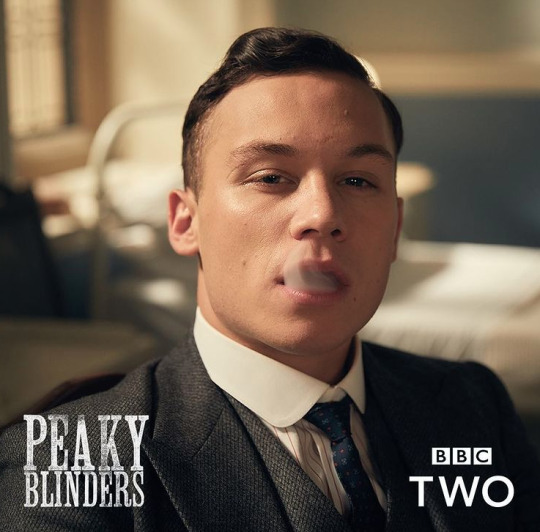
On Thursday, TNT announced that the upcoming sixth season of ANIMAL KINGDOM will be its final season.
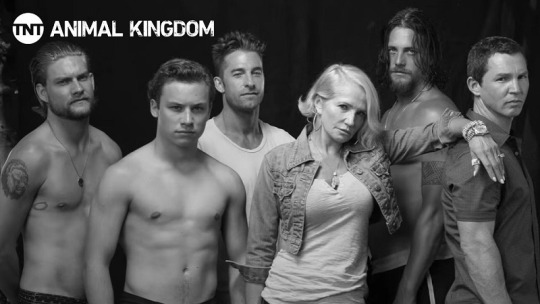
Finn can be currently seen in the film DREAMLAND with Margot Robbie, and will next be seen in HERE ARE THE YOUNG MEN, directed by actor Eoin Macken (The Night Shift, Merlin).
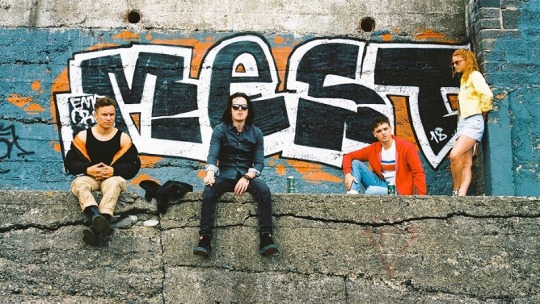
The film also stars Dean Charles Chapman (1917), Ferdia Walsh-Peelo (Vikings, Sing Street) and Finn’s PEAKY BLINDERS wife Anya Taylor Joy.
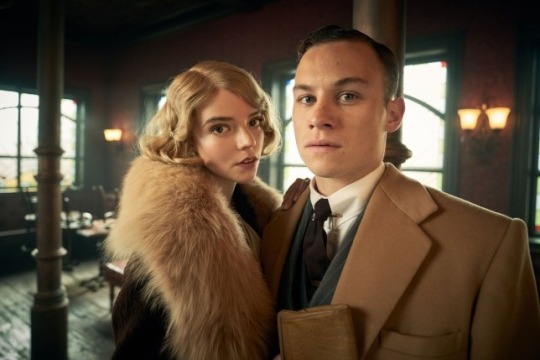
Speaking of Anya Taylor Joy, she is amongst the actors nominated for a Critics Choice Award. Anya was nominated in the category of Lead Actress in a Limited Series/Made for TV Movie for Netflix’s THE QUEEN’S GAMBIT.
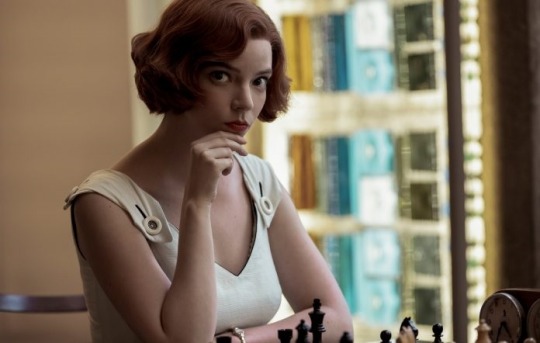
Her competition in that category is: Shira Haas (Unorthodox), Cate Blanchett (Mrs. America), Michaela Coel ( I May Destroy You), Daisy Edgar Jones (Normal People, Tessa Thompson (Sylvie’s Love).
The surprises to me are Nicholas Hoult being nominated in Lead Actor for a Comedy Series

amongst Jason Sudeikis (Ted Lasso),
S2 currently filming

Matt Berry (What We Do in the Shadow), Eugene Levy (Schitt’s Creek), Hank Azaria (Brockmire) and Ramy Youseff (Ramy); surprised by no nomination for Elle Fanning in THE GREAT, no nomination for Ben Whishaw, Timothy Olyphant, Jack Huston or any of the female actors who gave extraordinary performances this season of FARGO (congrats to Chris Rock and Glynn Turman for their nods); no Ethan Hawke nomination for his performance in THE GOOD LORD BIRD (though his two costars received nods); Quibi dominated the short form category but no nomination for THE MOST DANGEROUS GAME which garnered Christoph Waltz an Emmy nomination or #FreeRayshawn whose two leads Laurence Fishburne and Jasmine Cephas-Jones won Emmys; the nomination for Betsy Brandt in the superb finale of SOULMATES. I did not see that coming.
The other Critics Choice nominees.
BEST DRAMA SERIES
Better Call Saul (AMC)
The Crown (Netflix)
The Good Fight (CBS All Access)
Lovecraft Country (HBO)
The Mandalorian (Disney+)
Ozark (Netflix)
Perry Mason (HBO)
This Is Us (NBC)
BEST ACTOR IN A DRAMA SERIES
Jason Bateman – Ozark (Netflix)
Sterling K. Brown – This Is Us (NBC)
Jonathan Majors – Lovecraft Country (HBO)
Josh O’Connor – The Crown (Netflix)
Bob Odenkirk – Better Call Saul (AMC)
Matthew Rhys – Perry Mason (HBO)
BEST ACTRESS IN A DRAMA SERIES
Christine Baranski – The Good Fight (CBS All Access)
Olivia Colman – The Crown (Netflix)
Emma Corrin – The Crown (Netflix)
Claire Danes – Homeland (Showtime)
Laura Linney – Ozark (Netflix)
Jurnee Smollett – Lovecraft Country (HBO)
BEST SUPPORTING ACTOR IN A DRAMA SERIES
Jonathan Banks – Better Call Saul (AMC)
Justin Hartley – This Is Us (NBC)
John Lithgow – Perry Mason (HBO)
Tobias Menzies – The Crown (Netflix)
Tom Pelphrey – Ozark (Netflix)
Michael K. Williams – Lovecraft Country (HBO)
BEST SUPPORTING ACTRESS IN A DRAMA SERIES
Gillian Anderson – The Crown (Netflix)
Cynthia Erivo – The Outsider (HBO)
Julia Garner – Ozark (Netflix)
Janet McTeer – Ozark (Netflix)
Wunmi Mosaku – Lovecraft Country (HBO)
Rhea Seehorn – Better Call Saul (AMC)
BEST COMEDY SERIES
Better Things (FX)
The Flight Attendant (HBO Max)
Mom (CBS)
PEN15 (Hulu)
Ramy (Hulu)
Schitt’s Creek (Pop)
Ted Lasso (Apple TV+)
What We Do in the Shadows (FX)
BEST ACTOR IN A COMEDY SERIES
Hank Azaria – Brockmire (IFC)
Matt Berry – What We Do in the Shadows (FX)
Nicholas Hoult – The Great (Hulu)
Eugene Levy – Schitt’s Creek (Pop)
Jason Sudeikis – Ted Lasso (Apple TV+)
Ramy Youssef – Ramy (Hulu)
BEST ACTRESS IN A COMEDY SERIES
Pamela Adlon – Better Things (FX)
Christina Applegate – Dead to Me (Netflix)
Kaley Cuoco – The Flight Attendant (HBO Max)
Natasia Demetriou – What We Do in the Shadows (FX)
Catherine O’Hara – Schitt’s Creek (Pop)
Issa Rae – Insecure (HBO)
BEST SUPPORTING ACTOR IN A COMEDY SERIES
William Fichtner – Mom (CBS)
Harvey Guillén – What We Do in the Shadows (FX)
Daniel Levy – Schitt’s Creek (Pop)
Alex Newell – Zoey’s Extraordinary Playlist (NBC)
Mark Proksch – What We Do in the Shadows (FX)
Andrew Rannells – Black Monday (Showtime)
BEST SUPPORTING ACTRESS IN A COMEDY SERIES
Lecy Goranson – The Conners (ABC)
Rita Moreno – One Day at a Time (Pop)
Annie Murphy – Schitt’s Creek (Pop)
Ashley Park – Emily in Paris (Netflix)
Jaime Pressly – Mom (CBS)
Hannah Waddingham – Ted Lasso (Apple TV+)
BEST LIMITED SERIES
I May Destroy You (HBO)
Mrs. America (FX)
Normal People (Hulu)
The Plot Against America (HBO)
The Queen’s Gambit (Netflix)
Small Axe (Amazon Studios)
The Undoing (HBO)
Unorthodox (Netflix)
BEST MOVIE MADE FOR TELEVISION
Bad Education (HBO)
Between the World and Me (HBO)
The Clark Sisters: First Ladies of Gospel (Lifetime)
Hamilton (Disney+)
Sylvie’s Love (Amazon Studios)
What the Constitution Means to Me (Amazon Studios)
BEST ACTOR IN A LIMITED SERIES OR MOVIE MADE FOR TV
John Boyega – Small Axe (Amazon Studios)
Hugh Grant – The Undoing (HBO)
Paul Mescal – Normal People (Hulu)
Chris Rock – Fargo (FX)
Mark Ruffalo – I Know This Much is True (HBO)
Morgan Spector – The Plot Against America (HBO)
BEST ACTRESS IN A LIMITED SERIES OR MOVIE MADE FOR TV
Cate Blanchett – Mrs. America (FX)
Michaela Coel – I May Destroy You (HBO)
Daisy Edgar-Jones – Normal People (Hulu)
Shira Haas – Unorthodox (Netflix)
Anya Taylor-Joy – The Queen’s Gambit (Netflix)
Tessa Thompson – Sylvie’s Love (Amazon Studios)
BEST SUPPORTING ACTOR IN A LIMITED SERIES OR MOVIE MADE FOR TV
Daveed Diggs – The Good Lord Bird (Showtime)
Joshua Caleb Johnson – The Good Lord Bird (Showtime)
Dylan McDermott – Hollywood (Netflix)
Donald Sutherland – The Undoing (HBO)
Glynn Turman – Fargo (FX)
John Turturro – The Plot Against America (HBO)
BEST SUPPORTING ACTRESS IN A LIMITED SERIES OR MOVIE MADE FOR TV
Uzo Aduba – Mrs. America (FX)
Betsy Brandt – Soulmates (AMC)
Marielle Heller – The Queen’s Gambit (Netflix)
Margo Martindale – Mrs. America (FX)
Winona Ryder – The Plot Against America (HBO)
Tracey Ullman – Mrs. America (FX)
BEST TALK SHOW
Desus & Mero (Showtime)
Full Frontal with Samantha Bee (TBS)
The Kelly Clarkson Show (NBC/Syndicated)
Late Night with Seth Meyers (NBC)
The Late Show with Stephen Colbert (CBS)
Red Table Talk (Facebook Watch)
BEST COMEDY SPECIAL
Fortune Feimster: Sweet & Salty (Netflix)
Hannah Gadsby: Douglas (Netflix)
Jerry Seinfeld: 23 Hours to Kill (Netflix)
Marc Maron: End Times Fun (Netflix)
Michelle Buteau: Welcome to Buteaupia (Netflix)
Patton Oswalt: I Love Everything (Netflix)
BEST SHORT FORM SERIES
The Andy Cohen Diaries (Quibi)
Better Call Saul: Ethics Training with Kim Wexler (AMC/Youtube)
Mapleworth Murders (Quibi)
Nikki Fre$h (Quibi)
Reno 911! (Quibi)
Tooning Out the News (CBS All Access)
#television#tv#tv talk#anya taylor joy#the queen's gambit#nicholas hoult#finn cole#Peaky Blinders#cillian murphy#entertainment news#the critics choice awards#awards#award season#awards season#animal kingdom#The Great#the good lord bird#shira haas#unorthodox#ted lasso#jason sudeikis#soulmates#here are the young men#uk actors
132 notes
·
View notes
Text
Why is my feed not melting down over what an absolute goddess Wunmi Mosaku is?!? I can't even find stills online of the sex scene that made me happier than any sex scene ever has. I mean it's complicated for other reasons BUT LOOK AT THIS GORGEOUS WOMAN.

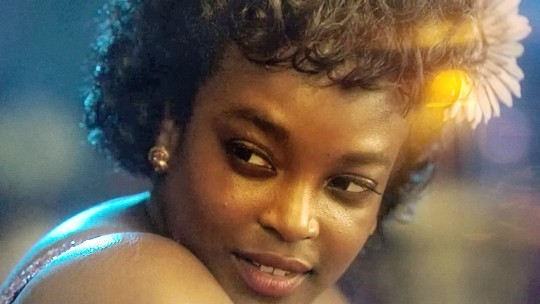


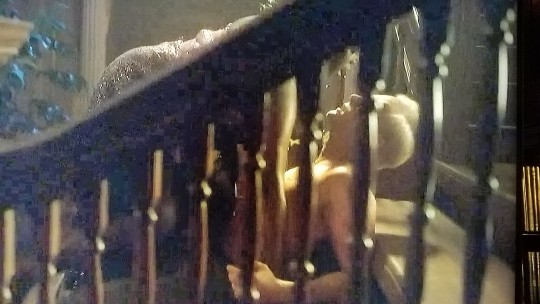
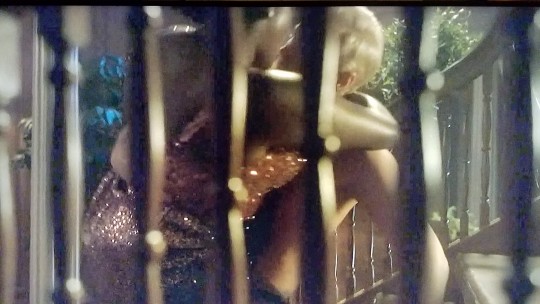

She can SING and then those seductive eyes and then this symmetrical athletic man looking at her like he's never seen anything so beautiful. And her straight up unapologetic sitting on him on the hard stairs and then he picks her up to flip her over and you can see why this is now my fluffy ass's favorite thing in the whole wide world right?!?
Lovecraft Country is AMAZING and there is so much thought put into it and the characters and story and costumes and references and the _everything_ but holy fucknuggets this scene is everything to me for other reasons.
190 notes
·
View notes
Text
Music Rabbithole Of The Night...
Forgot I got part of the Lovecraft Country Soundtrack. Look, if you can hear Wunmi Mosaku sing, you should her voice is amazing.
Started tonight watching Death on the Nile (2022). Sophie Okonedo plays a bluesy singer and the voice sounded familiar.
Turns out it's Sister Rosetta Tharpe, the Godmother of Rock n Roll.
Then I couldn't think of where I'd heard her recently.
That got me to Wunmi Mosaku in Lovecraft Country.
1 note
·
View note
Link
The wonderful Mancunian actress Wunmi Mosaku can be seen grappling with a leather-skinned monster in the horror film His House and drinking a body-swapping potion before having sex with a wizard in the HBO/Sky series Lovecraft Country. Pure hokum, right? After all, this is a woman who made her name with gritty performances on British television in Moses Jones and Luther, and who won a Bafta for playing Gloria Taylor, mother of the murdered Damilola, in Damilola, Our Loved Boy. Has moving to Los Angeles played havoc with her sense of reality?
Actually, no. His House and Lovecraft Country belong to a new generation of accomplished, provocative stories that invite us to compare the terror and violence of genre fantasy with that of the real world. They include the Emmy-winning Watchmen miniseries, which used Alan Moore’s superhero saga as a jumping-off point to explore bigotry and civil rights, and such racially charged horror movies as Us and the Oscar-winning Get Out, both directed by Jordan Peele, who is an executive producer on Lovecraft Country.
“The horror of humanity is the real horror, the things that we put people through,” says Mosaku, 34, via Zoom from Atlanta in the US. It’s hard to disagree. The most disturbing thing about His House isn’t the haunted council home assigned to her character, Rial, and her husband, Bol (Sope Dirisu), on their arrival in the UK from South Sudan. It’s what the couple endured before they got there: massacres, institutional brutality and losing their child as they cross the Mediterranean in a rubber dinghy.
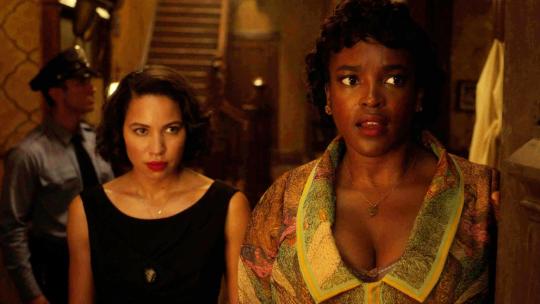
Jurnee Smollett alongside Mosaku in the HBO/Sky series Lovecraft Country ALAMY
Meanwhile, the fang-filled, head-chomping bogeymen in the Fifties-set Lovecraft Country are puppy dogs compared with the racist cops, lynch-hungry rednecks and white men burning crosses on the lawn of their black Chicago neighbours.
The fantastical elements of His House have their roots in Rial and Bol’s grief, guilt and trauma. Yet Mosaku thinks that the heightened experience of watching horror, with its jump scares, musical cues and manipulative editing, is “a great vehicle” for conveying those more earthbound emotions. “It helps with empathy,” she says. “The tension, the way one’s heart beats when watching something that’s terrifying.”
In this tricksy new dramatic world we’re often not sure if the monsters are real. The events of His House, Mosaku says, “feel like they could absolutely be in their heads”. In Lovecraft Country three characters wake up the day after a horrific battle with the aforementioned fanged beasts but two of them can no longer remember it. This is a kind of gaslighting, echoing the way that black people’s testimony of mistreatment has been challenged.
Mosaku’s hardest scenes in Lovecraft Country came when her character, Ruby, drinks a potion that temporarily turns her into a white woman. This allows her to experience privilege — suddenly, strangers are deferential and policemen believe what she says. Things take a more lurid turn when she drinks the potion before having sex with a white man (actually a white woman in magical disguise — it’s complicated). At an, erm, crucial juncture, the potion wears off and her pale skin cracks and peels away.
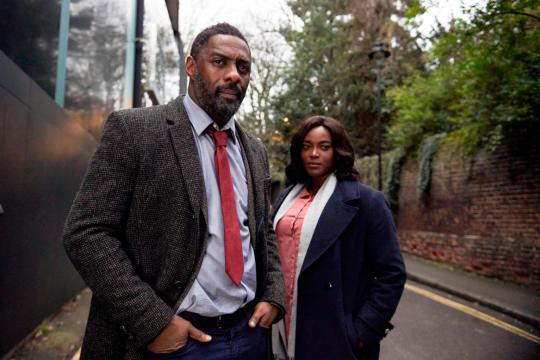
Idris Elba with Mosaku in Luther, one of the British TV shows in which the actress made her name BBC/ALAMY
It’s an upsetting sequence, aesthetically and symbolically. “It brings up lots of crazy thoughts and rage and pain,” Mosaku says. “But I think the reality is that if any of us changed the skin that we lived in, whether it was to be someone who was disabled or Asian or LGBTQ+, the world changes how it reacts to us.
“People are threatened because of my skin [which] is weaponised against me,” Mosaku says. “My stature and the fact that I don’t conform to Western ideas of beauty with my afro and my west African gap [teeth]. I have to overcompensate, to say, ‘That isn’t me. Just because I’m 5ft 9in and black doesn’t mean that I’m threatening.’ I am a happy, joyful person. But I am not allowed to express any kind of frustration or anger, because I get boxed straight back into that thing that they always thought I was.”
Born in Nigeria, she moved with her family to Manchester when she was a year old. Her parents had been professors, but struggled to find similar work in the UK. In the end her mother started her own business and her father returned to Nigeria after the couple split up. Mosaku loved music as a girl, singing for 11 years with the Manchester Girls Choir, and she shows off her gorgeous voice in Lovecraft Country, belting out Is You Is or Is You Ain’t My Baby in a party scene.
She doesn’t speak Yoruba, her parents’ native tongue. “It’s a real shame,” she says, telling a story from her primary school years to explain why. She is dyslexic, but at that point it was undiagnosed. “My teachers saw I was struggling with reading and writing and told my parents that they needed to stop speaking Yoruba in the house, which is crazy, because they would never have done that to a French family.” For His House she learnt Dinka, the dominant language of South Sudan, as well as being tutored in the culture of the region and hearing testimonials from refugees who had made the journey through the Sahara to north Africa and across the Mediterranean.
She was set on studying maths after school until she decided at the 11th hour that she preferred acting. Hearing that another Mancunian, Albert Finney, had gone to Rada, she applied and got in. Soon after graduating she was being directed by Rupert Goold in Rough Crossings at the Lyric Theatre in Hammersmith, London, and appearing in David Hare’s The Vertical Hour at the Royal Court. “Theatre is my jam,” she says. Every time she and her American husband come to the UK, “We will see a play as soon as we land. We’ll go to the Young Vic with our suitcases straight from the flight.”
After several years of yo-yoing between America and the UK, Lovecraft Country is the first time she has worked in the US for an extended period. It’s not certain whether the show will return for a second season, despite critical plaudits and ratings that compare favourably with other HBO series such as Watchmen and Succession. Either way, Mosaku seems happily ensconced in Los Angeles, where she lives with her husband, who she would rather not name.
There are strong rumours of a role in Loki, the superhero spin-off series in which Tom Hiddleston returns as the trickster god from the Marvel films, alongside Owen Wilson and Gugu Mbatha-Raw. “I have no idea what you’re talking about,” Mosaku says, with an evenness that sounds practised. Given that she’s speaking from Atlanta and that’s where they’re filming the show, it would seem a good bet.
Eventually Mosaku says she would like to move behind the camera. “Even some of my favourite films, it might be a black story, but it’s written by a white person and directed by a white person,” she says. That’s the next barrier for people of colour, and it’s starting to come down, thanks to Peele; Misha Green, the creator of Lovecraft Country; Remi Weekes, the director of His House, and the like.
Mosaku talks about the notion of double consciousness, as explored in Toni Morrison’s novels: “The way that the world will box me up before I’ve even had a chance to prove who I am. It’s exhausting. Trying to do things without having to explain or apologise is really refreshing. That’s what I love about Lovecraft and I think His House does it too. We don’t need to explain. Let’s just be.”
His House is in cinemas now and on Netflix from October 30. Lovecraft Country is on Sky Atlantic, Now TV, Amazon and Google
15 notes
·
View notes
Text
Dancing On the Edge (2013)

8/10
Ah the Imagine Me and You reunion.
A really good vintage drama with a great soundtrack.
Matthew plays a forward thinking, open-minded journalist eager to change the music world. His East-London accent is accurate and thankfully not Dick van Dyke. Who knew that Matthew could conduct?! P.S Stephen, thank you for the train scene!
Chiwetel truly is fantastic here. I really hope that it was him playing the piano! He keeps calm in difficult situations and shows such dedication to his craft.
Both Angel and Wunmi are fantastic singers and I didn't think that I was a fan of jazz but this series has changed my mind.

The main problem with the series is that we learn a lot about the white characters but we don't get very much information about Louis and the band. I would have liked a few more scenes learning about Carla and Jessie. Also maybe give the band more than 1 line per episode? I am glad though that Carla did not become jealous of Jessie and her success.
Plus they should have given Jenna Coleman more to do. Seriously more than just correcting typos.
Props to the costume department for creating a dress for Pamela that is very similar to the 1930 Lanvin evening gown
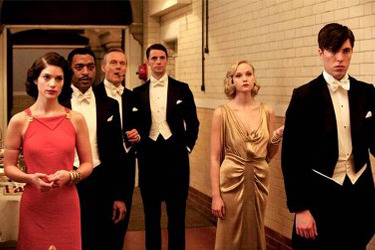

An enjoyable watch but I kinda hoped that Matthew would sing (and sing well)
[Sources-Dancing on the Edge poster, variety, amazing adornments and images not mine]
24 notes
·
View notes
Text
I haven’t said this enough but Wunmi Mosaku (Doc’s FC) can sing and she’s just wonderful
#ooc#Feegle's rambles#If I felt like it I'd incorporate it into Doc but also...that would require some originality and it is too late in the evening for that#Nonsense for ts
1 note
·
View note
Note
for the fake film thing: natalia tena, john boyega, gemma chan, olivia colman, wunmi mosaku, emma thompson
this was so much fun thank u elly!! could see this one as either a movie or a tv show tbh. west country witch content!
Song: Love Drought, Beyoncé
you, you, you and me could make it rain now / you, you, you and me could stop this love drought
Title: The Witches of South Bristol
Flip (Natalia Tena), Stevie (Gemma Chan) and Grace (Wunmi Mosaku) are witches. They’re other things too - Flip sings in a band, Stevie’s a barmaid and Grace drives the 24 bus from Ashton Vale to Southmead. But mostly they’re witches and best friends, and it’s been that way since they were teenagers. Stevie’s boss Mrs Rivett (Olivia Colman) helps them, as much as a witch who had her powers removed in the nineties by the High Council of Witches, Wizards and Warlocks in England and Wales (HCWWWEW for short) can. It was for Inappropriate Uses of Magic for Personal Gain in a Business Environment - she says getting a pub forever was worth it. So they’re doing alright. But things are starting to change. Flip’s band want her to go on tour, Grace’s non magical step-brother Aaron (John Boyega) has moved in after a messy breakup, and their new landlady Mrs Froggatt (Emma Thompson) is acting suspiciously. When they overhear Mrs Rivett and Mrs Froggatt having an argument in the garden, they start to piece together a thousand year old mystery, learning new things about magic and each other in the process.
~lets make fake films!~
4 notes
·
View notes
Photo

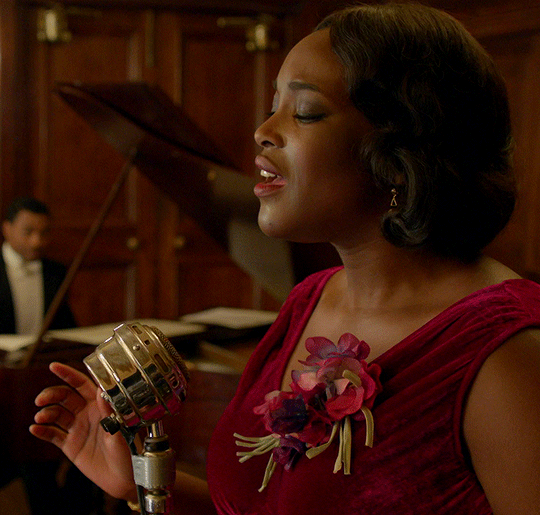


WUNMI MOSAKU
Dancing on the Edge, Episode 2 (2013)
#wunmi mosaku#dancing on the edge#perioddramaedit#wonderfulwoc#my edits#my gif#i mean i knew she could sing#but i wasn't prepared for this
665 notes
·
View notes
Text
His House and the Horror of “Otherness”
https://ift.tt/eA8V8J
“My perspective is about other people that cinema doesn’t necessarily cater for,” says director Remi Weekes, whose debut His House recently arrived on Netflix. It’s an extremely accomplished first film which tackles big social issues while leaning hard into horror. In the run up to the film’s release talk of awards was being bandied about. The movie landed on Netflix on October 30 – just before Halloween, certainly, but also traditionally the start of the run up to the big awards push. 2020 is of course a trash fire, with awards season shifted till later in 2021 but we wouldn’t rule out attention falling on Weekes’ film, cast and crew.
“I think there’s a bit of confusion as to which box to put it in,” says Weekes.
His House is the story of two Sudanese refugees (Wunmi Mosaku and Sope Dirisu) who make it to Britain and are put up in a house but given an endless set of restrictions (“no ball games, no balls, no games” says Matt Smith’s council worker, reading from an impossibly long list) and told they mustn’t work and can’t live anywhere else. But they have bought something with them and it won’t leave the couple alone.
This is an asylum seeker story, but also a British story, one that looks at past trauma, culture and otherness as well as the bureaucracy of the systems in place and it feels very new and very relevant.
“I think when you are not a white, straight man and you love cinema, or not even cinema but any kind of culture, whether it’s music or art, you have to love it, but it’s always very noticeable that your life is rarely reflected on screen,” says Weekes. “It doesn’t stop you loving it, like I love Alfred Hitchcock, I love Stanley Kubrick. I think their stuff’s amazing. But you never watch that and think it bears any resemblance to the lives of anyone that I know in my life.”
Representing different stories is important to Weekes.
“For me as a filmmaker the people that will be in my films are always going to have some kind of connection to my experience, whether that’s being a person of color or being ‘othered’ in some other way. And so, the color of the film, the stories within the film, are going to be slightly different,” he says.
That ‘othering’ is incredibly important throughout His House. Mosaku’s character Rial explains to her doctor that the markings on her face and arm delineate loyalty to two different groups in Sudan who are fighting and killing each other. The first she was given as a little girl, the second she gave to herself. “I survived by belonging nowhere,” she explains.
Meanwhile her husband Bol is so desperate to fit in in his new community that he buys clothes that mirror exactly the man in the advert on the wall of the store, and goes to the local pub where he joins in singing a song about Peter Crouch (“He’s big, he’s red, his feet stick out the bed…”).
“One of the books I really enjoyed was The Good Immigrant, and that says a lot about the need for immigrants to be good or to be accepted by society or the government. And so I guess that’s an acknowledgement of the need for immigrants or people who could be demonized, to be performative, in order to be accepted,” Weekes says.
Weekes had made shorts and commercials before coming on board His House. It was a project already in development that he was invited to pitch his take on by two producers he was sharing office space with.
“They wanted to make a horror film about immigration. But the writers that were working with them at the time [Felicity Evans and Toby Venables], they weren’t quite getting it to the place they wanted it to be, and they asked me if I wanted to pitch them my idea,” Weekes explains. “I went back to them with, I guess, how the film is today, a more psychological, personal story of two people trying to survive, after surviving, and how to move forward from trauma and guilt.”
Indeed, in the film is it only through Rial and Bol making peace with their past that they can move forward.
The movie is anchored by terrific performances from its two leads, both of whom have starred in high profile shows this year. Dirisu was a stand as Elliot in Gangs Of London – an action role which required some impressive choreography and stunt work, while Mosaku was a powerhouse as Ruby, taking on another very different horror role in Lovecraft Country. Weekes says he was lucky to be able to get the two to audition together, particularly since Mosaku lives in LA.
“When we were able to get them together, it was it. We had the two stars. They’re perfect. And they kind of knew each other, because I guess the acting scene is quite small when you’re a person of color, so they knew each other. There was already a kind of intimacy there, and they just connected,” he explains.
The other main character of course, is the house.
“We shot in Tilbury in Essex, which is a small community, a pretty tough community,” Weekes explains. Once they’d found a house they liked they shot there for a few weeks before recreating that on a sound stage. “Once we were in the sound stage, it gave us the opportunity to really transform the house and turn it inside out and really go wild.”
The walls are hacked to bits by Bol who finds spirits and ghosts living inside them until eventually nothing is left (metaphorically at this point) but the kitchen wall surrounded by the ocean they risked their lives to cross which took the lives of so many others as Bol stoically tries to eat his dinner with a knife and fork rather than use his hands.
It’s an incredible image (and is in fact the poster image) which Weekes managed to achieve by transporting the kitchen wall into one of the water tanks they had set up, lighting it exactly the same as the kitchen scene before so they could do a pull out to reveal the ocean.
“Using the ocean as not just a key element of but also a way to uncover his buried traumas, was something very fun,” says Weekes, though he acknowledges it may have been less fun for his leading man. “Poor Sope, him having to fall into the water, then I say, ‘Cut. Can you do it one more time?’ And he’ll be like, ‘Okay.’ I didn’t mean to keep doing that. I think that was the day he hated me the most….”
For the ghosts that we see in the house but also beneath the waves in the ocean Weekes says authenticity was important for him.
“It was always a conversation about what they should look like. And throughout the making of the film they changed a lot, from being very artistic and graphic and really using bold references from South Sudan, to being very true to life. Like what would that people look like?” he says. “We’re always trying to find that line because you want it to feel honest, but then you also want to have fun with it. Whenever we were debating, we would always edge towards honest more than stylized.”
As a result the movie manages to be political and timely but also very scary. Weekes loves horror, all sorts of horror (“My favorite films are from Rosemary’s Baby to The Shining, but also one of my favorite films is Scream. And another favorite film is A Nightmare on Elm Street, or even the Final Destination movies – the sequence on the motorway with the tree trunks was just so good…” he laughs) and describes himself as “lowbrow highbrow”.
Perhaps His House is just a perfect example of how audiences and critics are changing in terms of attitudes to genre – no longer the dirty secret of cinema, horror movies are becoming more celebrated as a home for weighty performances, explorations of big ideas, important social commentary, a place to tell new stories, hear new voices, shine a light on unfamiliar experiences. And do that at the same time as scaring the sock off audiences – this isn’t something new to horror but it could signal a shift in its wider reception.
“A lot of the time with the genesis [of horror movies] comes from scaring teenagers,” says Weekes, delving into the idea of being ‘lowbrow highbrow’ “And so because of that kind of connection, it’s not seen as high cinema. And maybe that’s kind of what I’m getting at. I find it hard to draw a distinction between the two. When you have a really great story that tells you something about the world, it’s exciting.”
His House is available to watch on Netflix now.
The post His House and the Horror of “Otherness” appeared first on Den of Geek.
from Den of Geek https://ift.tt/2HRqxje
0 notes
Text
Wunmi on stage with Tosin on the drums and an Orchestra in New York – Eyes of a Lagos Boy
In recent years Ibitayo Omowunmi Olaiya popularly known as Wunmi has wowed audiences from Aukland to Zanzibar, Sao Paolo to Detroit, New York to Lagos with her stagecraft, costumes, powerful singing and amazing dance moves. She delivers challenging and empowering lyrics with total conviction, woven into an innovative soundscape.
Wunmi is currently set to release her long awaited sophomore album titled See Me. Recorded in Ghana, the sound draws from many sources: Afrobeat, house, funk, high life, drum & bass, soul and is crafted by the finest musicians. Wunmi co-wrote the album with Producer, Kwame Yeboah and composer Jeremy Mage.
The Afro-Funk star, born in London, raised between Lagos and the UK and now living in New York stayed longer than usual in Lagos this year due to COVID-19 and said, “it has turned out to be a blessing.” Wunmi closed the Eko Theatre Carnival last August in a psychedelic, energetic show that made the Lagos crowd in Bariga scream and beg for more. She revealed to eyesofalagosboy.com, “I have always dreamt to return home to Lagos. This year has been a dream come true, collaborating with Segun Adefila and his troupe (Crown Troupe of Africa) remains priceless.”
Wunmi’s early recordings were realized as a featured artist on the tracks of house music producers Masters at Work, Pasta Boys, Osunlade and Bugz in the Attic —through her reworks of Fela Kuti tracks ‘Expensive Sh*t’ and ‘Zombie’.
Wunmi at the Eko Theatre Carnival, Lagos 2020 – Eyes of a Lagos Boy
Wunmi at the Eko Theatre Carnival, Lagos 2020 – Eyes of a Lagos Boy
Since her debut album ALA (African Living Abroad) in 2006, she has been touring and participating in festivals, live shows around the world working with numerous artists in the process, including six-time Grammy winner Arturo O’Farrill & the Afro Latin Jazz Orchestra, Roy Ayers, King Sunny Ade and Kesiah Jones.
In 2015, Wunmi released the singles ‘Emergency’ and ‘Dont Look Away’ featuring the legendary Roy Ayers on vibraphone and vocals. Wunmi’s 2016 collaboration with South Africa’s House music duo Black Motion titled ‘Omo Dudu’ was the lead single off their platinum album.
youtube
Wunmi is also a gifted dancer, she toured with WOMAD in UK and Japan as a solo dancer and travelled around the world as Ornette Coleman’s dancer/muse. Back in 1989, Wunmi was the dancing silhouette in the video of global hit ‘Back to Life’ by Soul II Soul. In 2020, Wunmi opened and featured in Beyoncé’s multiple award winning project Brown Skin Girl music video, fresh and relevant as ever.
Added to being a dancer – musician, Wunmi is a costume designer of repute. In New York, she partnered with RK Brown, Marlies Yearby, Alvin Ailey, Debbie Allen and others. She designs and makes her own stage costumes, her Wow Wow fashion line is produced in partnership with artisans in Nigeria and Togo.
Enjoy ‘Fit Body’ off Wunmi’s upcoming Album See Me.
youtube
Wunmi – The Afrofunk Queen returns with a bang In recent years Ibitayo Omowunmi Olaiya popularly known as Wunmi has wowed audiences from Aukland to Zanzibar, Sao Paolo to Detroit, New York to Lagos with her stagecraft, costumes, powerful singing and amazing dance moves.
0 notes
Text
Actress Wunmi Toriola Runs Into Serious Problem While Trying To Help A Fan (Photo)
Actress Wunmi Toriola Runs Into Serious Problem While Trying To Help A Fan (Photo)
Wunmi Toriola
Actress Wunmi Toriola has taken to her official Instagram page to share the screenshot of how she landed into trouble while trying to help a fan who slid into her DM.
It all started after the actress shared a video of herself listening to Joeboy’s “Don’t call me back”.
The fan then slid into her DM seeking to know the title of the sing she was listening to.
She replied the fan that…
View On WordPress
0 notes
Text
Orville Peck is Here, He’s Queer—And He’s Canada’s Biggest New Star
Orville. Peck. It sounds like someone’s grandpa.
But he’s a young, hot, queer cowboy clad in colourful vintage Western gear and covered in tattoos. Peck’s debut LP, Pony, was instantly acclaimed by all the snobbiest music journos and fashion magazines as an unforgettable chimera of old-school country, shoegaze and sadboi R&B that goes down as smooth as honey. His voice is filled with Roy Orbison longing and Chris Isaak smouldering desire.
But more notably, and always, there’s the mask: a Lone Ranger-esque face covering with a foot of inky fringe. To say it hides Peck’s real identity isn’t entirely correct. It’s true that “Orville Peck”—who these days is based in Toronto—isn’t the singer’s real name, but you get the sense that the masks are an essential part of who he is, onstage and offstage. And while it’s possible to find Peck’s “real” name online—compelling, if unconfirmed, reports point to an erstwhile punk drummer from Vancouver—knowing who is behind the fringe adds nothing to the music. The mystery, the look, the songs: It’s all a piece. Peering out from behind the mask, his huge baby blues shoot you down. Beautiful and unattainable. The eternal conundrum. Somehow, a masked man sings our pain best.
Photography by Wunmi Onibudo
The masks are Peck’s trademark; he owns over 20 now, which is especially impressive considering he sews them himself. “I just started naming them; I haven’t named all of them yet, but it’s fleshing out their personalities a lot more,” he laughs over the phone. “One’s called Cheryl, and one’s called Iris, after my mother and my grandmother, respectively.” All his life, he felt unable to let go of his insecurities while performing—to be truly authentic. Then, he donned a mask. Here, at last, was the key. It was the mask that gave him the confidence to totally open up at the very first Orville Peck show, to sing out his heart’s true secrets. Covering up revealed all. “It has definitely helped me feel a little less exposed but at the same time completely exposed,” he says. “It’s an interesting double-edged sword, because it actually helps me feel confident enough to sing about really, really personal stuff.”
“Patsy Cline also really spoke to me when I was little; her lyrics have a dark, lonely quality to them.”
Peck says he comes from a long, proud line of subversive country artists, like Johnny Cash, Willie Nelson, Merle Haggard—and even Buddy Holly. Growing up, however, he listened to a lot of Western women. “I think, subconsciously, I was probably more connected to their perspective because it was slightly more marginalized,” he says. “Dolly Parton especially—she did everything kind of tongue-in-cheek, making social observations in subtle ways. Patsy Cline also really spoke to me when I was little; her lyrics have a dark, lonely quality to them.”
Photography by Wunmi Onibudo
Peck leaned into the darkness—and camp. Inspired by Porter Wagoner’s rhinestone-studded Nudie suits and the films of David Lynch and John Waters (Female Trouble is his ultimate fave), he created Orville Peck rather than becoming a CMT clone. (Other fashion inspirations include the fringe and leather of 1980s rodeo queens Parton and Reba McEntire and the boot-cut jeans and white T-shirt minimalism of 1990s Garth Brooks and Tim McGraw.) “Every generation falls into this trap where people think apathy is cool: doing the least amount and pretending they don’t care. That has just never appealed to me,” he says. “A lot of people question my sincerity and my art because I put a lot of effort into the visuals and the story. But those are the things I’ve always admired in artists. I could go onstage in jeans and a T-shirt and just, like, sing about nothing, but when somebody tries a bit harder, people seem to respond to it really well, which is great.”
And from that effort, Peck has been selling out shows across North America months in advance, including two nights in Los Angeles, where he’s running a drag rodeo. (He yearns to incorporate live ponies trotting around the stage or, perhaps, pipe in a signature scent. What would it smell like? “A barn.”)
“What’s really lovely is that maybe what I’m doing allows some of those people to know it’s OK. You don’t have to stand on the outskirts and enjoy this from afar; you can be a part of this. You are, already, a part of this.”
Such commitment and soulfulness attracts a motley group of admirers, including, Peck says, Middle America dads who sing Peck’s super-gay tunes en famille in the car on the way to school. He draws fans from many tribes: Americana, pop, goth country, new wave. (He even has stans already: PeckHeads.) His unabashed queerness—in “Big Sky,” for example, he sings about romancing boxers and jailers—also welcomes LGBTQ country lovers back into the fold, he says, remembering the gay man (descended from a long line of rodeo clowns) who told Peck that thanks to Peck’s unique brand, he finally felt able to embrace his country roots. “Before, we weren’t allowed to have a voice,” he says. “What’s really lovely is that maybe what I’m doing allows some of those people to know it’s OK. You don’t have to stand on the outskirts and enjoy this from afar; you can be a part of this. You are, already, a part of this.”
Peck is, it turns out, a true millennial cowboy. He has experienced some catharsis from his success, yes, but he still feels…unmoored, or incomplete, somehow. “That’s part of what Pony is about, too: It’s coming to terms with the fact that I’ll always feel a bit unsettled, and I probably will always have anxiety, and I probably will always feel a bit lonely,” he says. “The lovely thing is noticing that other people connect with that as well. Rather than that curing the problem, it just helps me understand that stuff doesn’t need to be negative.”
That is, after all, the cowboy way. According to Peck, being a cowboy has nothing to do with having a horse or wearing a cowboy hat. It’s being able to keep your head high, despite the solitude, despite being an outsider. “It’s finding the power in yourself and being able to ride on your own,” he says. And so Peck rides, singing for himself, singing for us all. Not all heroes wear capes. But some wear masks.
The post Orville Peck is Here, He’s Queer—And He’s Canada’s Biggest New Star appeared first on FASHION Magazine.
Orville Peck is Here, He’s Queer—And He’s Canada’s Biggest New Star published first on https://borboletabags.tumblr.com/
0 notes
Text
'I met you when you were 19 and I've watched you blossom into our matriarch' - Tunde Obe celebrates his wife, Wunmi at 50
‘I met you when you were 19 and I’ve watched you blossom into our matriarch’ – Tunde Obe celebrates his wife, Wunmi at 50
Entertainment power couple, Tunde and Wunmi Obe have yet anther reason to celebrate today as Wunmi clocks 50. The singing couple have been together for over 30 years and blessed with three children. They dated 10 years before getting married in 1998. In a special birthday message to his wife, Tunde Obe wrote, 'Happy 50th Birthday to the love of my life. My golden girl @ 50. I met you when you…
View On WordPress
0 notes